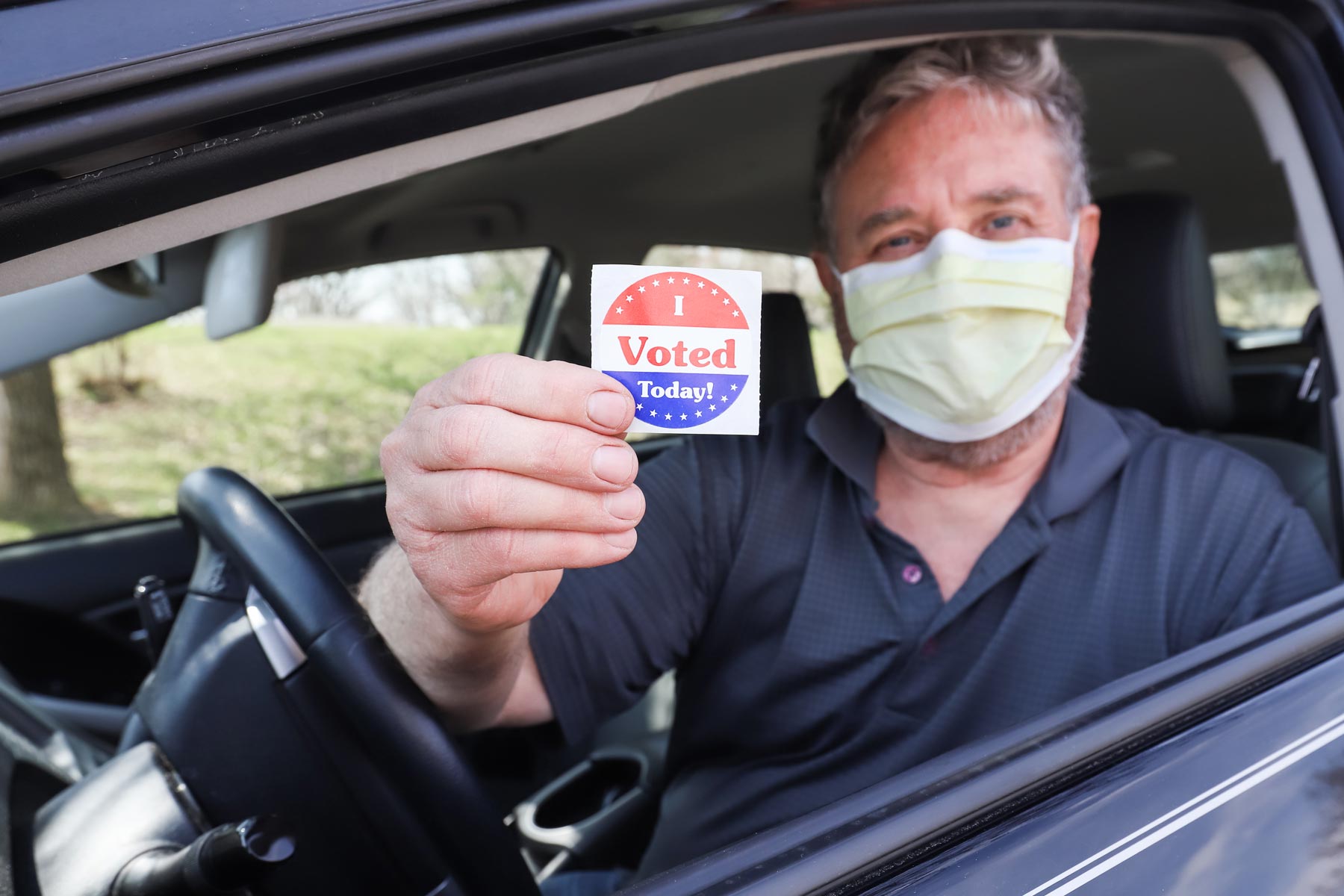Free Consultation
(314) 500-HURT100+ years of combined experience and over $200 million won for our clients in Missouri and Illinois. Contact a personal injury lawyer near you.
Free Consultation
(314) 500-HURT
Voting in the 2020 election ends in two weeks. I would say its in two weeks, but 35 million Americans have already voted as of the time of this email.
It is important for us to understand the rules protecting voters against intimidation or supersession. Voting in
America is flooded with examples of voter intimidation and voter suppression in the past. By 1940, voter suppression
campaigns were so successful that only 3% of eligible African-Americans in the South were registered to vote.
In the last few weeks, we see news reports of limited polling places and long lines, which affects access. We all
know that not all Americans vote, it seems to be declining and we complain about voter apathy.
In St. Louis, I have worked at polls with hours-long lines in higher minority residential areas and my polling place
in a whiter area is pretty short.
And just two weeks ago, our president has criticized the voting process and legitimacy, with varying replies about
accepting results. In the national debate urge supporters to go into the polls and ‘watch very closely’ while
questioning the integrity of the 2020 election.
Fears of voter intimidation follow this.
Here’s a pic of my dad telling my son voter intimidation stories.
Under the law, voter intimidation is defined as the use of threats, coercion, or attempts to intimidate
for the purpose of interfering with the right of another person to vote or to vote for the person of their choosing.
Voter intimidation is still a problem in the United States and may be a growing problem especially with the
controversial presidential election that is coming up. Below are some examples that Voters have reported as
intimidation tactics:
Voter intimidation greatly exceeds voter fraud.
Over the years Congress has recognized that voter intimidation undermined the principles of democracy and in 1940
passed laws that criminalized voter intimidation.
Voter intimidation is defined under 18 U.S.C. § 594 which states that:
whoever intimidates, threatens, coerces, or attempts to intimidate, threaten, or coerce, any other person
for the purpose of interfering with the right of such other person to vote or to vote as he may choose, or of
causing such other person to vote for, or not to vote for, any candidate for the office of President, Vice
President, Presidential elector, Member of the Senate, Member of the House of Representatives, Delegate from the
District of Columbia, or Resident Commissioner, at any election held solely or in part for the purpose of electing
such candidate, shall be fined under this title or imprisoned not more than one year, or both.
Other voter intimidation-related laws include:
Voter intimidation is a felony – a person found guilty of violating the federal voter intimidation law can be
sentenced up to one year in prison and fines up to $1,000 fine.
Voter suppression, intimidation, misleading information and disorderly conduct is illegal under Missouri law too. For
example, baseless challenges, intimidating voters, spreading false information or interfering with a voter or
polling place may result in criminal or civil penalties. Any activity that threatens, harasses or intimidates voters
should be reported to the authorities below.
Did you know that a voter’s identity or qualifications may be challenged by election personal or duly authorized
challengers? (not by anyone in the polling place).
Missouri laws allows challengers credentialed by political parties to be present in the polling place and challenge a
voter’s eligibility. Mo. Rev. Stat. § § 115.105.1, 115.429.2. Each party is allowed to designate a watcher only at
locations where votes are counted, who are there to observe the counting of votes. Mo. Rev. Stat. § 115.107.1
Further, under Mo. Rev. Stat. § 115.105.1 challengers:
All a challenger may do is raise a challenge to the voter’s eligibility with a poll worker. However, a challenge can
only be made when the challenger reason to believe the election laws of the state have been or will be violated.
Voters should be aware of reports that some challengers may not be well-trained and are being encouraged to
aggressively challenge and in some instances have challenged voter’s eligibility on non-legitimate legal grounds.
Examples of challengers acting in a non-legitimate ground can include mass challenges, challenges targeted to
minority precincts or those based on information like foreclosure lists may violate the Constitution and Voting
Rights Act.
Under no circumstance should an eligible voter be denied a regular ballot solely on the basis that his eligibility is
challenged.
Only a select amount of people are allowed inside the polling place which include:
All other people are not allowed in polling places.
These people are only allowed to e in the polls as long as they are not interfering with the elections process. Mo.
Rev. Stat. § 115.409. All other people (other than election officials and voters) must be at least 25 feet from the
entrance to the polling place. Mo. Rev. Stat. § 115.637(18).
In Missouri, exit polling, surveying, electioneering, distributing election literature, posting signs regarding a
candidate or an election issue are prohibited in the polling place or within 25 feet of the polling place.
Finally, it is illegal in Missouri for anyone at a polling place (inside or out) to breach the peace, engage in
disorderly conduct or impede the election process. Mo. Rev. Stat. § 115.637.
If any of these laws are broken the polling site should be reported immediately.
Missouri Law further prohibits anyone one to induce, threaten, impede or prevent or attempt to impede or prevent
someone from voting by abduction, duress or any fraudulent device. Mo. Rev. Stat. § 115.635 (1)(2)(3).
Missouri further prohibits employers to prevent employees from engaging in political activities, for anyone to
interfere or attempt to interfere with voting in the polling place, or to engage in any disorderly conduct, breach
of peace, violence or threats or violence that will impede or interfere with the election. Mo. Rev. Stat. § 115.637
Voters should also be aware of misleading information that confuses voters and prevents them from voting is illegal
under Missouri Law.
Any information that disseminates untrue information about the timing of the election, or erroneously tells voters
that they cannot vote if they have back-due child support, owed back taxes, have an outstanding warrant, have unpaid
tickets or have had their home foreclosed upon.
In addition, it is illegal for anyone to attempt to coerce, intimidate or bribe any member or employee to vote or
refrain from voting in a particular way. Mo. Rev. Stat. § 130.028
Voter intimidation is a huge issue that most voters are not aware of but should be. Voters who experience voter
intimidation should report all illegal challengers or watchers conduct, voter intimidations or deceptive practices
to the following agencies:
Founder | Injury Attorney
Gary Burger has dedicated his career to standing up against bullies. The founder and principal attorney of Burger Law | St. Louis Personal Injury Lawyer has helped hundreds of Missouri and Illinois individuals and families recover th …
Years of experience: 30 years
Location: St. Louis, MO

Similar Blog Posts

Whether travelers are staying relatively close to home, visiting hot spots like Nashville or Chicago, or traveling further to the east or west coast, an accident can happen at any ... read more.

We are running a contest on Facebook to give away two tickets to the May 24, 2024 Cardinals - Cubs game! Enter below and best of luck! read more.

This month, Burger Law is partnering with Nurses for Newborns for a Donation Drive. We're collecting baby and food items for them. Here's the list of what they need. Here’s... read more.

This page has been written, edited, and reviewed by a team of legal writers following our comprehensive editorial guidelines. This page was approved by Founding Partner, Gary Burger who has more than 30 years of legal experience as a practicing personal injury trial attorney. Gary’s robust legal knowledge is recognized by his peers as demonstrated by his industry awards and frequent Continuing Legal Education (CLE) lectures.
NO FEES UNTIL WE WIN YOUR CASE
We offer free consultations and are available 24/7 to take your call. Live chat, text, and virtual meetings are available.
or call us at